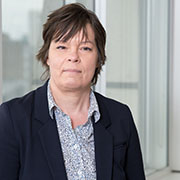In my 11 years at the Medical Research Council (MRC), I have become immensely proud of the achievements of MRC and the researchers it funds.
When visiting our units, centres and institutes, I love listening to the scientists and research teams explaining their work and am in awe of what they make possible.
As we confront climate change, medical research is increasingly vital not only to understanding, preventing, and treating diseases, but also to understanding the relationship between the environment and human health.
There is much more to be done. I am privileged to help enable this in my role of supporting our institutes with excellent facilities.
A difficult balance
However, I know that in conducting this research, we use a large amount of energy with laboratory consumables such as single-use plastics and hazardous materials presenting most of MRC’s waste.
The MRC science estate enables scientists to undertake hugely complex work, which is often reliant on precise environmental conditions. Systems to manage these requirements are energy intensive.
MRC must become environmentally sustainable, but equally must not stop science. In fact, we need to do more. This tension is sometimes difficult to balance correctly.
Progressing towards change
Over the next 15 to 20 years, MRC will embark on what may be one of the most significant changes experienced in the organisation. As part of UK Research and Innovation, MRC is fully committed to achieve a net zero position by 2040, with a 50% reduction by 2030. This transformation will touch every activity in the organisation.
There are already many activities taking place within MRC to achieve net zero, but we are at the very beginning of this process. The MRC environmental sustainability programme has received a mandate from our Executive Board.
Currently, we are focusing on preparing the foundations to transform our estate. A feasibility study is underway to provide plans for decarbonisation of the estate to increase biodiversity, and to improve the working environment for our staff.
MRC’s institutes have signed up to Laboratory Efficiency Assessment Framework, referred to as LEAF, which supports this work for laboratory operations. It gives guidance on how to run ‘green’ research laboratories, and staff and scientists in the institutes are working on identifying and applying the knowledge in their area of responsibility.
Measures that form part of the practical applications include:
- fitting automatic sash closers to windows
- installing electric charging points
- changing to LED lighting.
MRC also funds a programme for finding solutions that will help us to support improvements to the environmental sustainability of our operations. This is currently waiting for full proposals from the community. The Natural Environment Research Council, NHS England and the Department of Health and Social Care are actively involved, given the similarity of the challenges across the health sector.
Keeping engaged for a better future
This work cannot be done without the active engagement of the research community and with scientists rethinking their work. We have launched a seminar series, that will open these discussions on many subject matters including:
- laboratory operations
- health and safety
- finance.
The first, focusing on facilities, will take place on 15 July 2022.
We will also be working alongside a broad range of partners, to share insights, knowledge and best practice, to support improving environmental sustainability across the wider sector.
I know that 2040 as the target for net zero is a huge challenge and I am not yet clear how we will achieve this. At the same time, I am also genuinely concerned that 2040 may not be early enough. However, I trust in science and the community to find ways of solving some of the ‘known unknowns’ so we preserve our research and our planet.
Top image: Credit: Olivier Le Moal, iStock, Getty Images Plus via Getty Images




